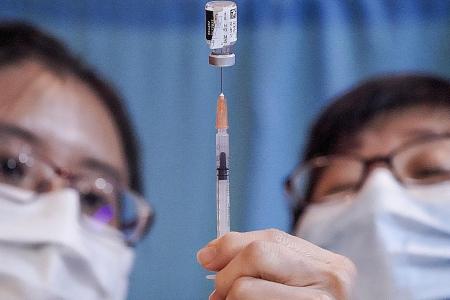Vaccine will not be reserved for those who choose to wait: Minister
Those who do so run the risk that vaccine supply may run dry
Supplies of the Covid-19 vaccine will not be reserved for people who choose to wait when their turn to get the jab comes, said Mr Lawrence Wong, co-chair of the multi-ministerial task force tackling the pandemic.
Instead, the vaccines will go to whoever is next in line.
This is because Singapore's aim is to get everyone vaccinated as soon as it can, said Mr Wong, who is also the Education Minister.
"For those who choose not to take (it) up, it's your choice. But we will roll out and push out the vaccines regardless," he added in a press conference on Tuesday.
"If you want to wait, you must accept the consequence that perhaps if you wait... and you want to take it up later on, we may not have a ready supply."
Singapore's nationwide vaccination effort is now well under way, with priority going to healthcare staff, as well as those working in the aviation and maritime sectors.
It has received several shipments of Pfizer's vaccine and expects to get more vaccines from other manufacturers in the coming months.
If everything goes according to plan, the country will have enough vaccines for all citizens and long-term residents by the third quarter of this year.
Addressing reporters to mark one year of Singapore's battle with Covid-19, Mr Wong said Singapore sends out each batch of the vaccine as soon as it gets a fresh supply.
"We are not trying to hold back or ration the supply. It's not in Singapore's interest to do that," he said.
"Our interest is to get as many people vaccinated as soon as possible."
Added Health Minister Gan Kim Yong, the task force's other co-chair: "We are not going to reserve some for you if you decide not to be vaccinated."
If the scientific evidence indicates that vaccines significantly reduce the risk of transmission, the Government could make changes to existing rules, Mr Wong said.
For example, the stay-home notice period for travellers might be reduced or eliminated, while workers who currently have to undergo routine testing could have this requirement reduced.
Singapore might also further relax its safe management measures.
At present, however, it is not yet known how much the vaccine can reduce the risk of viral transmission, so these tangible and concrete benefits of vaccination cannot be reaped while the information is still pending, said Mr Wong.
When asked how the Government would convince reluctant Singaporeans to take the vaccine, Mr Gan stressed the importance of public education.
For seniors, the authorities will probably go from house to house, explaining the benefits of getting vaccinated and helping people make bookings, he said.
Get The New Paper on your phone with the free TNP app. Download from the Apple App Store or Google Play Store now



